Press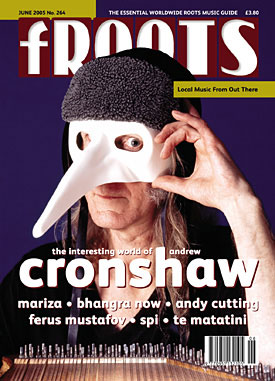
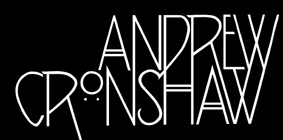
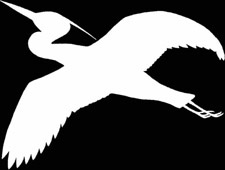
-Home- -Andrew Cronshaw home- -News & Live-
-SANS-
-Bio- -Discography-
-Press- -Gallery-
-Journalism-
-Reviews written for fRoots- -Contact-
Press
Click an album title to jump to extracts
from its reviews:
The Unbroken Surface of Snow
Ochre
On The Shoulders Of the Great Bear
The Language Of Snakes
Till The Beasts' Returning
The Great Dark Water
Wade In The Flood
Click
here to
read the cover interview
feature from fRoots, June 2005
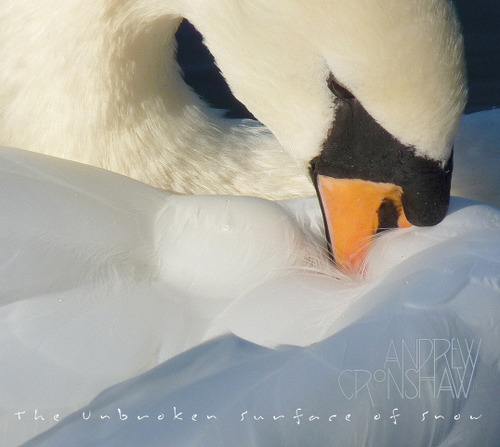
Andrew Cronshaw is a bravely experimental British composer and
multi-instrumentalist who is also a journalist. His last album, the much-praised
Ochre, released seven years ago, matched English folk melodies against Middle
Eastern instrumentation.
Here he is joined by three other musicians, including
Tigran Aleksanyan, a master of the Armenian duduk, for drifting and mostly
instrumental compositions that include echoes of British or Armenian traditional
melodies. Three tracks are duets with Aleksanyan, with Cronshaw playing the
gently chiming zither, whistles, pipes or the enormous Slovak fujara flute.
There's a solo zither treatment of a stirring Scottish traditional melody, and
the remarkable 34-minute title track, based on a Finnish creation myth, on which
zither and duduk are joined by clarinet, saxophone and singer Sanna
Kurki-Suonio, apparently improvising the melody that suddenly enlivens this
delicate, haunting exercise in glacial mood music.
- Robin Denselow, The Guardian
The 34-minute title track is a Finnish creation myth set to a musical landscape that is as close to silence as heavy snowfall, and more beautiful" - Tim Cumming, The Independent
Stunningly beautiful - Fiona Talkington, BBC Radio 3
A consummate piece of instrumental story-telling in steady
growth. Music of snowflake-like singularity
- Ken Hunt, fRoots
The music is sparse, glacial and utterly beautiful, with a
wide, panoramic sense of infinite space: you will happily lose yourself again
and again in the title-track, a far northern wilderness transformed into sound.
- Tim Cumming, Songlines
Absolutely exquisite - Mary Ann Kennedy, BBC Radio Scotland / BBC Radio 3
Andrew's music always sounds so naturally integrated, so right; in spite of its diverse sources, the movement from genesis of ideas to recording is a truly organic process. The wide-open sound vistas evoke winter journeys across a bleak, snowy Scandinavia (trips that Cronshaw has himself made). There is a deep introspection to most of the five pieces and an unhurried pace to their conception but this is never less than entrancing and an immersive experience. - John Crosby, R2
Sublime - Max Reinhardt, BBC Radio 3
Andrew Cronshaw's music is a lovely marriage of various venerable traditions, meticulous construction and spontaneous invention. Spacious, gracious, subtle, quietly surprising - Doug Spencer, ABC Australian national radio
Unfolds, seduces and ultimately mesmerises - Tony Hillier, The Australian
Sometimes while listening you discover a snatch of a melody that evokes a memory of familiar music. But what Cronshaw et al do with these traditional sources borders on magic. The Unbroken Surface of Snow is an orgy of relaxation, meditation, mood, reflection - Marius Roeting, New Folk Sounds (Netherlands)
A palpable sense of space and peace - Norman Chalmers, Scotland on Sunday
Here is a great beauty that you might not notice
immediately; it took me several months.
The music just came flowing towards me, as if I was on a summer meadow, looked
up at the sky and saw white clouds drift past. Or a winter night out in the
country with the Milky Way's glittering ribbon of stars.
Such occasions when there is all the time in the world and no boundaries
- Lennart Wretlind, Swedish national radio P2
If the BBC ever make a sequel to Frozen Planet, here surely is its emotive soundtrack - David Quantick, Uncut
A stunning but subtle new recording. These musicians bring
to life a quiet, sometimes almost silent musical landscape that defies any genre
or category you might try to put it in -
CDRoots (USA)
Music with an almost tangible sense of space
and history, yet with none of the constraints that come with genre
-
Richard Thornley, Penguin Eggs
(Canada)
Andrew Cronshaw is a true pioneer of the world music/roots
scene. Years ago, Cronshaw captivated listeners with his glistening zither
playing on traditional English, Irish, and Scottish tunes (it's worth revisiting
Till The Beasts' Returning, or the recently
reissued The Great Dark Water). There would
be hints of Cronshaw's wide-open ears, and an affinity for Finnish (especially
On the Shoulders of the Great Bear from
2000) and other music of far northern climes. 2004's
Ochre brought Cronshaw back to the music of the British Isles, but
infusing the tradition with guests from other musical traditions. And now, seven
years later, comes the equally unhurried The Unbroken Surface of Snow.
Like the title of the album itself, the
compositions hint at broad expanses of space, and in fact the music develops as
if hanging over a frozen desert. On three tracks ("Käärme", "Fujaruk",
and the live "Im Hogutz"), Cronshaw is accompanied by Tigran Aleksanyan
on the duduk. The duduk's low tones sweep and call over the empty space here,
while Cronshaw adds zither, reed pipes, fujara (a Slovakian shepherd flute),
kantele, and the Chinese ba-wu flute to the mix. Each track is an exercise in
minimalism, and while composed (Cronshaw mentions in the liner notes that
"scattered throughout are traditional melodies, mostly English or Armenian, or
fragments of them") there is empathic improvisation between the musicians as
well. The tracks between Cronshaw and Aleksanyan are instructive for not only
what is said by each, but also by what is not said in this deep, unfolding
music.
"The Unbroken Surface of Snow"
is a journey in itself, derived from the Finnish national epic The Kalevala.
Cronshaw and Aleksanyan are joined by Ian Blake (soprano sax) and Sanna
Kurki-Suonio (vocals; Kurki-Suonio sang in the group
Hedningarna).
Kurki-Suonio brings us the runo-song of how Väinämöinen created the world;
following tradition, she also fashions her own tune in the process. At nearly
thirty-five minutes, the result is an ever-shifting piece of enacted, beautiful
magic.
Whenever Cronshaw's zither ("Mhàiri
Mhin Mheall-Shùileach" is a solo piece) or kantele playing emerges, I'm
overcome with feeling as if some long-lost memory of mine is shifting under a
frozen crust of snow. Ultimately, The Unbroken Surface of Snow is a bold
exercise in contemplation; and like snow itself, it falls silently and
accumulates additional weight and resonance with repeated listening.
- Lee Blackstone, Rootsworld (USA)
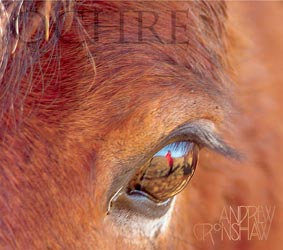
"As a hardened philistine when it comes to English folk music, I was taken aback to find myself enjoying an album whose sleeve note documents the exact provenance of each track, establishing that they are all indeed English folk tunes.
…the musicians approached the melodies with fresh ears, and the result is an
album that will be surely welcomed with open arms throughout the world."
Charlie Gillett, BBC Radio London & BBC World Service
"One of the finest albums of the year"
Fiona Talkington, BBC Radio 3 Late Junction
"It’s the sense of rootedness in a gritty, marginal England that allows this music its brush with profundity. And the fact that this landscape exists principally in Cronshaw’s head makes the achievement
all the more impressive."
Mark Hudson, Daily Telegraph
"This fabulously restrained and crystalline-cool album
consists of, strange to relate, versions of English folk tunes. Dominant
cultures generally don’t do folk very well (in these islands, Irish or Scottish
folk has a lot more spirit) because folk music has always been a way for
cultures under threat to rebel and forge a sense of identity.
Cronshaw’s take on English folk has a twist - it’s recorded with a panglobal ensemble...
The result is splendidly unclassifiable. Cronshaw is a musical adventurer.
My first impression of
Ochre was
that it could if anything be too tasteful - the kind of thing you might hear in
an upmarket spa. But further hearing reveals something deeper, woven with a
filigree of sounds - a meditative sense of landscape and place, with occasional
shafts of illuminated light."
Peter Culshaw, The Observer
"It's exotic and mysterious, and it comes as a shock to realise that the music being played is actually English" Colin Irwin, fRoots
"Consummate musicianship it may have, but it is
the ideas that seethe and shoal in this music that really excite."
Ken Hunt, Record Collector
"For a man with such a substantial discography and back catalog of collaborative enterprises to his credit, Andrew Cronshaw has somehow
managed to maintain a relatively quiet profile. Working with diverse artists,
master of eclectic instruments, and journalist on a wide range of traditional
music, it is not surprising that Cronshaw’s musical horizons have taken him a
long way from his British musical origins.
Ochre seems,
on paper at least, to be the mark of the full circle. It is an album based on
seven traditional English songs, and would appear to be something of a
home-coming project, a chance for Cronshaw to zoom in on his own cultural
soundings. But then one turns on the CD player, and the reality is very
different. The ‘Englishness’ of the project is not much in evidence at all.
Instead, we are compelled to explore the universality, the wider outlook and
potential of a tradition. Through the employment of an array of instruments -
harp, whistles, voice, piano, double bass, oud and more - the essence of each
song is taken on a journey like never before. Over freezing seas and desolate
mountains, through ghostly castles and smoky jazz clubs, the core of each song
is teased out, given the space and time to breathe."
Jennifer Byrne, Sing Out! (USA)
"Stripped of their English lyrics, the songs grow
contemplative rather than narrative, but the old strangeness of the tunes is
only enhanced by colorful instrumentation and understated performances:
Cronshaw’s zither has a crystalline, starry presence, given roundness by
Chhadeh’s qanun; the grim murder tale Lucy Wan is rendered airily unearthly
with just a ghostly harmonic whistle against Bernard O’Neill’s droning bass
while Sofía, The Saracen’s Daughter is sung in Arabic by Natacha Atlas. This
tale of a landowner kidnapped in Turkey, who befriends the jailer’s daughter,
who sets him free and years later follows him to England, holds the key to this
disc: the heart and soul know no boundaries."
Tom Jackson, Global Rhythm (USA)
"Treating a variety of British folk-songs by performing
them with unlikely varieties of instrumentation - Greek lyra, Syrian kanoun,
prepared piano and the vocals of Egyptian/British singer Natacha Atlas -
Cronshaw creates elegiac, dreamlike textures that override the tunes’ origins
and which place them in a global context. Slow-moving and reflective, the album
sets its own languid pace.
World Music Charts Europe
If anyone is guaranteed to create an exciting, stimulating and totally different album - even when the music’s origins are
very familiar – it’s Andrew Cronshaw. With his mastery of various exotic
instruments and his extraordinary musical vision, he never fails. Like previous
albums, it’s brilliantly adventurous, though it’s an adventurousness
characterised by remarkable restraint."
Keith Hudson, Taplas (Wales)
"As a passionate explorer of the world’s musical
undercurrents, there’s not a lot that surprises me any more. Yet once in a
while I come across a completely unexpected type of music that is so incredibly
beautiful that I stop all I’m doing and at the end of the record can only do
one thing: hit the repeat button."
Ton Maas, Ode (USA & Netherlands)
"This man is an English original. He paints unusual sound pictures with the melodies we love and brings out totally unexpected aspects of them." Vic Smith, The Folk Diary
"In a just world, a man with the talents of
Andrew Cronshaw would be a household name.
Cronshaw is a musician/producer of
rare quality. Don’t worry about categorising this album as folk, classical,
world or any other kind of music - just file under 'Essential'." Mel McClellan, BBCi
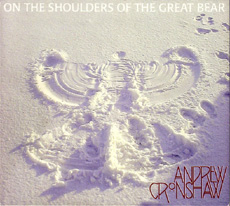
"Perhaps as a result of our being such a mix'n'match culture to begin with, British musicians excel in the subtle art of hybridisation. The average American muso, faced with the task of reconciling apparently disparate cultural modes, is more likely to use them as separate, ethnically 'correct' sections in some grandiose multipartite composition that has as little to do with the notion of combination as American society has with the notion of a 'melting pot' culture. We Brits, on the other hand, are fortunate enough to live in a culture that, rather than viewing other cultures with suspicion, exults in their very difference and seeks to introduce their music into our native strains.
There are few more specific indicators of a country's culture than its folk music, yet as far back as the mid-Sixties, the likes of the Incredible String Band were introducing such exotic elements as sitar and gimbri into their Celtic-mystic whimsy, with unparalleled commercial success. The zither virtuoso Andrew Cronshaw is, in some ways, the ISB's direct descendant. He has sought in his records to find some rapprochement between folk and New Age music, while his performances have struck out from folk's traditional bar-room home - in the early Nineties, for instance, he did a tour of English village churches.
Cronshaw's musical wanderlust drew him to Finland for 1993's The Language of Snakes, a connection that this long-awaited follow-up develops further. The most obvious link is between his zither and the Finnish kantele, but Cronshaw takes the connection further by introducing the marovantele, a hybrid of kantele and marovany, the Malagasy instrument familiar to him from his work with Madagascar's excellent Tarika. When that instrument is used to suspend twinkling trails of notes behind Ian Blake's meditative soprano sax figures, as on
Ema Haual/Hällilaul, the effect is utterly enchanting.
The tunes are mostly taken from traditional Finnish and Ural airs, along with a few others of Celtic derivation, but in each case Cronshaw blurs the borders to produce something unique, whether it is the layers of shawm, sax and concertina adding warm, Celtic textures to
Halullinen Sielu/Käin Minä Kaunista, or the Finnish singer Jenny Wilhelms offering a vocal interpretation of a Gaelic lament. Most striking of all is the title track, a reference to Finland's place in relation to Russia, in which jew's-harp sets up a hypnotic resonance behind the bizarre growled rap that Heikki Laitinen constructs from mythological runic imagery. Even at this early stage, it's safe to say you'll hear nothing else like it all year."
Andy Gill, THE INDEPENDENT
"Andrew Cronshaw's astonishing record is the album Oregon never made. Where they were sober and punctiliously eclectic, he is joyous and playful, and still utterly loyal to the traditions he explores. The cover photograph of his outline squirmed into fresh snow tells you most of what you need to know, for this is music that rightly relegates 'personal' expression to the ghostly fringes. It is utterly un-self-indulgent."
Brian Morton, SONGLINES
"a serene sense of purity beyond the realms of anything else most people have in their
collections, yet paradoxically sounding familiar enough to be welcoming too."
Colin Irwin, fROOTS
"...opens with the distant tolling of Finnish church bells. Under that Cronshaw slides the recorded debut of the 'marovantele' - a zither cross between Finland's kantele and the Malagasy marovany - playing two Estonian airs. Soprano saxophone, string bass and effects add to the atmosphere. Therein lies Cronshaw's gift. To list the sources of his material as Finnish, Ingrian, Estonian, Siberian and Scottish Gaelic may make this music sound fearsomely recondite but he is a master of atmosphere."
***** Ken
Hunt, CLASSIC CD
"One of my top CDs of 2000, from anywhere in the world. Inspired composition, inspired music..." Fiona Talkington, BBC Radio 3 LATE JUNCTION
"An enthralling album that proves that Northern Europe can be as much a source of 'world music' as Africa or Latin America." Dave Laing, MUSICIAN
"...the energetic, gritty title piece that features the unique sub-verbal growlings of one of Finland's national treasures, vocalist Heikki Laitinen, colliding and swirling with the instruments like a Bosch landscape. Andrew Cronshaw may not be prolific, but each of these fourteen songs is worthy of the waiting."
Cliff Furnald, ROOTSWORLD
"Cronshaw has taken sixteen traditional tunes, some are Finno-Ugrian (from Finland, Ingria and Estonia), one is Ob-Ugrian from Siberia and three are from the Scottish Gaelic-speaking tradition, and created a masterpiece with them. All are quite exquisite.
....a remarkably wonderful album, it washes over you taking you to new landscapes and new places within your psyche. For me it was a very melancholic place, a soulful place. It's great when an album hits you just right. If you like northern European music, its delicate nature, the hypnotic charm, then you'll be bowled over by this wonderful collection of tunes."
Tim Arthur, ENGLISH DANCE & SONG
"Here he plunges deeper and with even greater authority into ancient Finno-Ugric traditions, creating the sort of masterpiece that only he could. This is an album of starkly haunting beauty, full of unexpected twists and turns and it demonstrates once again Cronshaw's unique creative genius."
Keith Hudson, TAPLAS
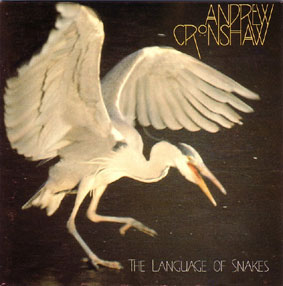 THE LANGUAGE OF SNAKES
THE LANGUAGE OF SNAKES
"Cronshaw's instrumentals are based on anything from Gaelic airs to Finnish songs and Galician marches, transformed with unexpected textures and arrangements, often with quite magical results. He's a confident multi-instrumentalist who plays zither, flute, clavichord, concertina, whistle, and a few more besides, augmented here and there by anything from fiddle and pedal-steel guitar to saxophone and a selection of Finnish traditional instruments.
A mixture like that could end up as musical chaos, but
Cronshaw treats his material with care. The result is a selection that ranges
from weird up-beat laments to sections (like the three Spanish pieces) that are
elegant, subtle and charming. He is heading for cult status."
THE GUARDIAN
"Describing music in terms of aural tapestries raises at very least eyebrows, at worst howls of derision, but some music is presented in such a way that it invites such comparisons.
The Language Of Snakes is that kind of record, but if it is gracefully sinuous, it is also vigorous and robust. On it, Cronshaw weaves Galician, Finnish and British strands more deftly than ever before.
MacDonnell's March/Kilcoy's March teams him and his flutes, for example, with the nyckelharpa of Arto Järvelä.
Ailean Duinn is down to flutes, whistles, shawms and percussion from Cronshaw, Ric Sanders' violin and Bernard O'Neill's double bass. And in the final suite, An Gille Donn/Vaskilinnun Vaikerrus, he is warp to Hedningarna's Sanna Kurki-Suonio's vocal weft. One of 1993's finest European folk albums. **** " Ken Hunt, Q
"It seems to have been forever since Cronshaw's last album, but the time has obviously not been wasted. Whether or not it's the effect of playing all those gigs in splendid old churches, his music seems to have been pared down to the bare essentials, and in doing so has acquired a sublime, crystalline clarity. Inspired, perhaps.
Folk tunes from all over Europe (Finland to Galicia via Ireland and the UK), played on an astonishing range of instruments (ba-wu to zither, via too many I've never heard of to mention), with loads of friends contributing - the potential for an uncoordinated mishmash is immense. But the whole album flows seamlessly from start to finish, with both a sonority and a lightness of touch that marks a master at work.
Just listen to the near classical feel of
Tupakkarulla + Tuuti Hussaa Ja Lullaa and the way it segues into The Other Boot Dance, or the Gaelic air
Tha Mi Sgìth 'M Ònaran played on a gu-cheng. Even ending the album with Cronshaw quietly (and contentedly?) whistling after some remarkable singing from Hedningarna's Sanna Kurki-Suonio seems just right.
Someone said the man's a star - the album is a gem."
Bob Walton, FOLK ROOTS
"We are deluged with new music that shows us the skill of the musician, the range of his or her instrumental prowess, and ability to play them all simultaneously via the recording medium. We are also drowning in a sea of cross-cultural fusions that do little to understand the cultures they are fusing. Cronshaw is an exceptional musician, not so much for his technical virtuosity on a number of instruments as for his appreciation of the beauty and simplicity of those instruments. Primitive flutes, woodwinds and zithers acoustic and electric are his main tools. His master of them is undisputed. It is his ability to turn them in new directions while holding true to their ancient intent that truly sets him apart.
On
The Language Of Snakes he explores many of Europe's most mystical vistas with an eye towards the faintly skewed. Joined by Finnish nyckelharper Arto Järvelä, Ric Sanders' fiddle, BJ Cole's pedal steel plus harmonica, reeds, bass, kantele etc., Cronshaw has arranged a series of songs from the British Isles, Finland and Spain that defy their roots as they emulate them." Cliff Furnald, DIRTY LINEN
"Andrew Cronshaw has a bag full of surprises that he unleashes with almost every turn as he incorporates a range of sounds into his broad vision of traditional music. On
The Language Of Snakes he is joined by an accomplished bunch of British and Finnish musicians who illustrate the magnificent depths of Cronshaw's imagination on a range of instruments as diverse as the ba-wu, cello, zither, flutes, nyckelharpa, clarinet, pedal steel guitar, harmonica, fiddle, clavichord, concertina and whistles.
If not for its fresh unpredictability, it's the kind of music that could have easily been burdened with the tag of New-Age Folk, but that would do little justice to the constantly shifting moods, the intriguing inventiveness and the tunefulness of this remarkable music. Outstanding musicianship and masterful instrumental arrangements shed light on a musical genius that has modernised the folk idiom without ever sounding ostentatious or contrived.
I am not aware of any music to match the blissful beauty of Cronshaw's uniquely lyrical instrumentals. And if you think this review is top-heavy with superlatives, just have a listen!" Dave Snell, BLUE JUICE
"Probably the best record of the year! 'What?', I hear you exclaim, '…who is this man Cronshaw? Never 'eard of 'im, squire'. There's no denying that this record isn't everyone's cup of tea, and it's hard to start describing it, but I'll try.
Andrew Cronshaw may look like an old hippy and play the electric zither. He may also have done a nationwide tour of village churches called the
'Splendid Venues Tour', but these are all plus points in my book and anyway hippies had some good ideas even if they weren't very good at expressing them.
This is mood music. It's texture music of the highest degree. It's folk music but don't let that put you off. It's one of the most imaginative aural soundscapes I've ever had the pleasure of luxuriating in. It's probably the best film soundtrack ever made, but still waiting for the right film producer to recognise that. It's got humour, spark and verve. It's thoroughly traditional, but has a pioneering spirit which crosses all know boundaries. I'd like to hear Andrew Cronshaw collaborating with The Orb. Only a smart move such as that would give him his deserved audience of 500,000 instead of playing to a few coughing old guys in a folk club in Walthamstow. But that's all part of the plot, I suppose - there aren't many Cronshaw heads, but they're all pretty devoted (hi, Stuart and Celia and Duncan H).
Cronshaw draws a lot of his inspiration from the Scottish Highlands and Western Isles, but with this, his sixth album, he's delving into Europe- the Castilla and Galicia regions of Spain to be precise. There's also a fine tune from central Finland which is extremely moving. And that's not all. With tunes that have blockbusting titles like
Cronnan na Caillaich a Bhan sa Bhein Bhreic there's no doubting that your man's serious.
Buy and cherish."
Pete Lawrence, ON
"I prefer my music to be on the raw side, sparsely arranged, and with voices. This is an album of instrumental music arranged with sophistication and delicacy, carrying only one vocal - and that sung in Finnish. I shouldn't like it really, but I do.
For years now Andrew Cronshaw has been putting together music to defy dogmatic purists like me and he's done it again. This album totally unbinds my hide, He's mixed together a selection of tunes from five global corners, used a clutch of exotic instruments including the ba-wu, gu-cheng (look 'em up) and electric zither, to produce an album reeking of class.
With BJ Cole, Brendan Power, Bernard O'Neill, Ric Sanders, Ian Blake, Chris Haigh, Neti Vaandrager, Arto Järvelä, Minna Raskinen and Sanna Kurki-Suonio in smooth support he works his way through tunes from Spain, Scotland, Ireland, Finland; and one from England, a brooding, moody version of Henry Burstow's
Through Moorfields.
This is the opening cut, setting the tone for a programme of gentle, serene and occasionally sombre music with a jaunty track or two for balance. Standouts are
Baile de Procesión (Spain), Waterford Waltz (A.C. plays a mean whistle) and the lone vocal, Sanna Kurki-Suonio singing in Finnish her own lyric to a Gaelic air with a coda like a satisfied sigh. Andrew Cronshaw has a rare gift, fully realised in this quiet gem of an album." Roy Harris, THE LIVING TRADITION
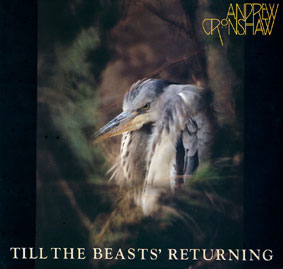 TILL THE BEASTS' RETURNING
TILL THE BEASTS' RETURNING
"For years Andrew Cronshaw has been patiently chipping away at the walls that moribund tradition erects around itself - mostly to little avail in terms of public recognition. With the dawn of a more enlightened age of roots music, it is to be hoped that his efforts will meet with greater reward.
Cronshaw's talent is mercurial, like Jimmy Greaves; he's a snapper-up of unconsidered trifles, and perhaps the most unconsidered of the lot is the £20 electric zither which gives Cronshaw his most distinctive sound. The raw material for Beasts is 90 per cent Scottish, but Cronshaw's skill lies in grafting on to that a variety of eclectic musical influences which transform the finished product. He has a totter's instinct for spotting unlikely instruments - shawm, flute, dulcimer, concertina, synths and steelpans in addition to the zither - and he is the master of musical surprise.
There is always an element of risk in such pioneering - but risk creates excitement.
Giullan Nam Bo soars to quite majestic heights, whereas the whimsical metaphors of Saratoga Hornpipe come close to parody. Somewhat incongruously perhaps, Cronshaw is essentially a team man. He has surrounded himself here with a like-minded bunch of musical forty-niners. The result is an imaginative and brilliantly tuneful album, rich in texture - a heartening winter's tale.
Tony Rose, THE GUARDIAN
"Bless him. It's been a while, but once more the mad professor ventures forth to bring his own complex vision of folk music as high art form to a hopefully quizzical world.
His track record should speak for itself… musicians of his vision and unpredictability are rare and if you care to dig a bit you'll surely discover that much of the pioneering, probing music that's allied traditional themes with provocative ideas has revolved around this character. He's been unfortunate that his frequently exciting concepts have failed to achieve him recognition beyond avid cult status - Wade in the Flood certainly deserved a wider audience.
Well, he's back and with everyone listening to our sort of music with more open ears, Cronshaw's time may finally have come. Unconventional to the last, he's gone back to the tradition - or rather, traditions - because, while the source of this record is almost entirely Scottish, the music itself has a peculiar statelessness. Themes are pursued, discarded and rescued seemingly at whim and he leads us off into engrossing tangents without us realising it. Effortless, restrained and always subtle, Cronshaw has a Pied Piper quality about him as he himself meanders through zithers, Chinese flutes, clavichords, steel pans and other strange instruments you won't find on the average Spinners record.
Not, of course, that he's being flash and smartass about it. Virtuosity isn't the point - it's the mish-mash of ideas and theories that, this time around, escape the suspicion of academia that may have dogged him before, and this record is as charming as it is fascinating and as engrossing as it is beautiful.
His instinct for using other musicians beyond their normal yardsticks - always one of his strengths - has never been better served and we find the maverick brilliance of Rory McLeod on harmonica lifting
Giullan Nam Bo and The Saratoga Hornpipe, and Martin Simpson's delicious lap steel distinguishing
Ho Ho Nighean Donn and its succeeding tunes.
And we get a bonus in the shape of an unaccompanied vocal from June Tabor,
Our Captain Cried, which Cronshaw includes for presumably no other reason than that he could! His old co-conspirator Ric Sanders is also regularly featured as are Rick Kemp on bass, Ian Blake, Rosie Cross, Steve Newman, B.J.Cole and Mark Emerson.
His spiritual home is surely in composing film themes. Meanwhile we're lucky to have him and if this doesn't at least achieve the status of The Brendan Voyage then we should all demand to know why. Welcome back, Andy."
Colin Irwin, FOLK ROOTS
"A wonderful voyage of ethnicity with Cronshaw majoring on the zither with contextual support from diverse instruments: violins, dulcimers, whistles and so forth. Packed full of surprises and delights, this is a glorious work, a thing of rare beauty to be cherished and adored. In a folk vein that's gone a little off the boil, this is the required stuff, and if you've got folk fans among your clientele, recommend this and they'll be your friend for life. Marvellous." D.H., MUSIC WEEK
"Aside from the title, everything here is both accessible and almost perfect, while Cronshaw's playing is - as usual - impeccable. At first hearing the album is ambient folk wallpaper music , but listen again and it becomes clear that Cronshaw is playing games with sound, texture and the whole folk meets new age genre. The instrumentals are deceptively simple and the eerie vocal from June Tabor is startling. Intriguing music from a creative mind. **** "
Andrew Vaughan, Q
"The opening strains of
The Dark-Haired Youth, featuring Cronshaw's electric zither, suggest new age music. However, the comparison proves short-lived and inaccurate. The British multi-instrumentalist's melding of styles predates the innocuous fad, and Cronshaw's often Celtic-folk based music comes from rich sources. The intelligence and wit of his arrangements further distances his approach from humorless new age pap.
His juxtaposition of Celtic and American folk styles on
Wasps In The Woodpile, with Martin Simpson's playful electric slide, highlights the album. Rory McLeod's harmonica perfectly offsets zither and violins on
Giullan Nam Bo, another especially inventive piece. Alalá de Castro/Ronda de Cuestación is an urgent and inexorable journey. June Tabor contributes a fine acapella rendition of
Our Captain Cried, a sole, but welcome, vocal intrusion."
Dorian Cohen, OPTION magazine (Los Angeles)
Reviews of the 2010 reissue on CD:
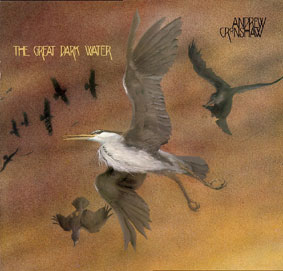 PROVING
HE WAS PUSHING BOUNDARIES WAY BACK WHEN
PROVING
HE WAS PUSHING BOUNDARIES WAY BACK WHEN
To
put the last decade or so's work into a deeper biographical context, turn to
this CD reissue of a vinyl album from 1982 which featured some of the British
folk scene's leading performers - including June Tabor, Ric Sanders, Steeleye
Span's Rick Kemp and a young Martin Simpson.
The Great Dark Water has Cronshaw
himself fielding electric zither, concertina, hackbrett (hammered dulcimer),
monophonic synth, flute and whistle, while the songs range from The Blacksmith
and The Wexford Carol to A Galician Processional and en extraordinary Tabor
vocal, strikingly odd phrasing, on The Ship in Distress. The emphasis is on
Gaelic and Celtic songs, with only one, the closing 'Empty Places' (featuring
Cronshaw's zither and Fairport's Ric Sanders on violin), being an original
composition.
It's an eclectic set, and in places even features
a very indie-sounding early-80s bass sound, à la New Order, on an innovative
take on the traditional, pre-Mendelssohn Fingal's Cave and a Shetland tune,
A
Yowe Came to Our Door. The Gaelic air, Gentle Dark-Eyed Mary, is stunning,
shared between Cronshaw's zither, Sanders' fiddle and Dave Bristow's piano -
another antique piece from the musical kitbag that Cronshaw knows just where to
put.
Tim Cumming, Songlines
In 1982 when The Great Dark
Water first appeared, Andrew Cronshaw was part of a nexus of British
musicians blurring what counted as folk or jazz. Prior to this album, he hadn't
made an album under his own name since Wade In The Flood for
Transatlantic four years earlier. It seemed as if he was more content to play
live and to expand his sound palette and library of musical ideas.
The team that realised his visions here were the
folk mafia hit squad of Fred Thelonious Baker (electric bass), Micky Barker
(drums), Dave Bristow (piano and synth), Jonathan Davie (electric bass), Vo
Fletcher (guitar), Rick Kemp (electric bass), Rachel Perry (oboe), Ric Sanders,
(violin), Martin Simpson (stringed things) and June Tabor (vocals).
Stylistically it has great flair and wit. In 2010
The Wexford Carol triggers memories of the Cronshaw-Sanders touring duo.
A Galician Processional foreshadows one strand of his later musical
adventures. Empty Places, with Bristow's synth swoops and dives, sounds
much like out-take music for Anglia Television's Tales of the Unexpected.
And Tabor's take on The Ship in Distress now sounds like a portent of her
sea-themed programme, debuted at the Queen Elizabeth Hall in September 2009, in
which it also appeared.
Since there is nothing in the way of contextual notes
here, after The Great Dark Water came projects aureoled in the folk
chronicle, notably his work with June Tabor on her albums Abyssinians
(1983) and Aqaba (1988). Never in a rush to whack out albums, his next
work under his own name was Till The Beasts' Returning (1988) and The
Language of Snakes (1993) - stories for another time. The Great Dark
Water was previously restored to the marketplace in its entirety as part of
Topic's now out-of-print The Andrew Cronshaw CD in 1989, and to have it
back is nothing less than a joy.
Ken Hunt, fRoots
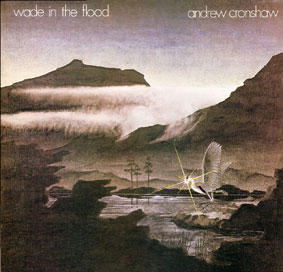 WADE IN THE FLOOD
WADE IN THE FLOOD
"The extent to which the folk revival, through some of its most gifted exponents and offshoots, has enriched popular music, is admirably illustrated by Andrew Cronshaw, whose particular contribution, apart from his other considerable musical gifts, is the electric zither.
Wade In The Flood firmly establishes his claim to credibility as a serious artist.
On this album, with the help, in various groupings, of Martin Simpson, Ric Sanders, Jon Gillaspie, Holly Tannen and Rick Kemp he gives us a magnificent selection of traditional and other items, including
the Abbots Bromley horn dance, a Cajun waltz (La Vals Du Grand Bois),
The Lament for Anach Cuain and the French-Canadian Eastern Townships' Waltz. A sparkling example of the sensitive handling of rich material."
Maurice Rosenbaum, THE DAILY TELEGRAPH
"He'd been around before, but it was last year that Andrew Cronshaw quietly but firmly launched himself upon the world with an enticing and heady album titled
Earthed In Cloud Valley. Wade In The Flood, made again with the big-uncle-to-the-folkies Bill Leader, is the logical and equally heady successor to that one.
A folkie perhaps, but not one of yer hearties caked in cow dung, Mr Cronshaw's approach is lyrical, tranquil, measured, but never static, and he brings in such eminences grises as Rick Kemp on bass, Ric Sanders on electric violin and Holly Tannen on Appalachian dulcimer for a pretty rich (and pretty) variety of natural and processed sounds.
It's maybe a slightly tougher, tighter approach overall than the previous LP, and
Table Mountain Road carries an overt jazzy slant, but Wade In The Flood has to be one of the sanest, most idiosyncratic and generally charming albums of the year." Susan Kluth, RECORD MIRROR
"Andrew Cronshaw's electric zither, backed by such accomplished session persons as Martin Simpson, Holly Tannen and Jon Gillaspie, affords one of the pleasantest and most interesting sounds currently around on the folk scene. It can be heard to advantage on Wade In The Flood." Michael Grosvenor-Myer, THE GUARDIAN
"Cronshaw is a highly gifted musician whose qualities would have made him a commercial giant if used for rock or soul. He uses them in folk music; but this fine LP comes close to a point where, if it were given a hearing in-store (especially at a season when in previous years Oldfield's In Dulce Jubilo and Steeleye's Gaudete were huge hits) it could win impulse buyers of all shades of taste." MUSIC WEEK
"Andrew Cronshaw's Earthed In Cloud Valley was on of the more intriguing of last year's albums; a sort of Tangerine-Dream-meets-folk that was moodily atmospheric. On
Wade In The Flood Cronshaw has elaborated his highly individual treatment of traditional folk melodies with his electric zithers and studio manipulations.
This time he's broadened his base of Martin Simpson guitars, Holly Tannen appalachian dulcimer and Rick Kemp bass, to take in Ric Sanders on electric violin and Jon Gillaspie on keyboards. The result is to add still more shades to his impressionist musical paintings.
It's the sort of thing John Peel slaps on as the penultimate track in his studio show, and if it's ever gripped your sensibilities briefly I can assure you that an album's worth of material doesn't drag either. Just take it in the spirit it was conceived." Hugh Fielder, SOUNDS